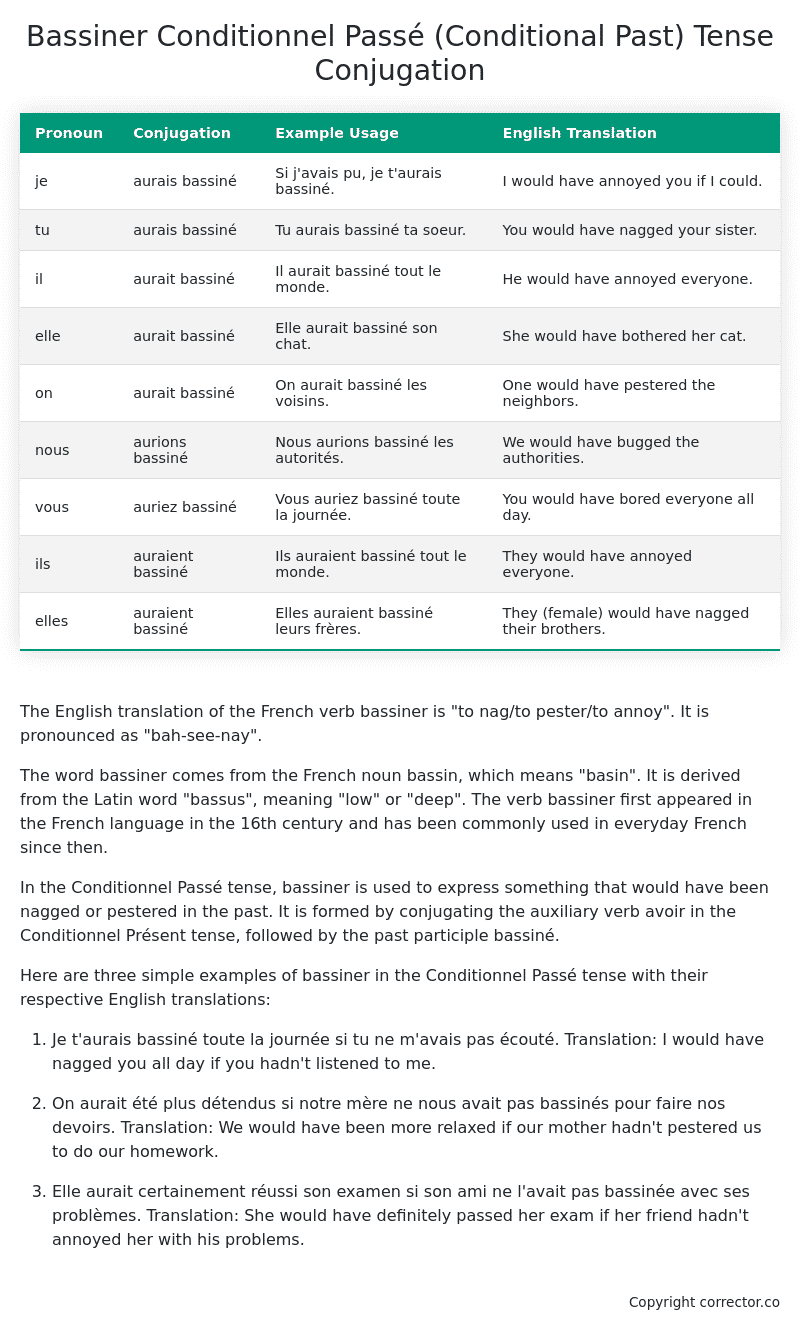Conditionnel Passé (Conditional Past) Tense Conjugation of the French Verb bassiner
Introduction to the verb bassiner
The English translation of the French verb bassiner is “to nag/to pester/to annoy”. It is pronounced as “bah-see-nay”.
The word bassiner comes from the French noun bassin, which means “basin”. It is derived from the Latin word “bassus”, meaning “low” or “deep”. The verb bassiner first appeared in the French language in the 16th century and has been commonly used in everyday French since then.
In the Conditionnel Passé tense, bassiner is used to express something that would have been nagged or pestered in the past. It is formed by conjugating the auxiliary verb avoir in the Conditionnel Présent tense, followed by the past participle bassiné.
Here are three simple examples of bassiner in the Conditionnel Passé tense with their respective English translations:
-
Je t’aurais bassiné toute la journée si tu ne m’avais pas écouté.
Translation: I would have nagged you all day if you hadn’t listened to me. -
On aurait été plus détendus si notre mère ne nous avait pas bassinés pour faire nos devoirs.
Translation: We would have been more relaxed if our mother hadn’t pestered us to do our homework. -
Elle aurait certainement réussi son examen si son ami ne l’avait pas bassinée avec ses problèmes.
Translation: She would have definitely passed her exam if her friend hadn’t annoyed her with his problems.
Table of the Conditionnel Passé (Conditional Past) Tense Conjugation of bassiner
| Pronoun | Conjugation | Example Usage | English Translation |
|---|---|---|---|
| je | aurais bassiné | Si j’avais pu, je t’aurais bassiné. | I would have annoyed you if I could. |
| tu | aurais bassiné | Tu aurais bassiné ta soeur. | You would have nagged your sister. |
| il | aurait bassiné | Il aurait bassiné tout le monde. | He would have annoyed everyone. |
| elle | aurait bassiné | Elle aurait bassiné son chat. | She would have bothered her cat. |
| on | aurait bassiné | On aurait bassiné les voisins. | One would have pestered the neighbors. |
| nous | aurions bassiné | Nous aurions bassiné les autorités. | We would have bugged the authorities. |
| vous | auriez bassiné | Vous auriez bassiné toute la journée. | You would have bored everyone all day. |
| ils | auraient bassiné | Ils auraient bassiné tout le monde. | They would have annoyed everyone. |
| elles | auraient bassiné | Elles auraient bassiné leurs frères. | They (female) would have nagged their brothers. |
Other Conjugations for Bassiner.
Le Present (Present Tense) Conjugation of the French Verb bassiner
Imparfait (Imperfect) Tense Conjugation of the French Verb bassiner
Passé Simple (Simple Past) Tense Conjugation of the French Verb bassiner
Passé Composé (Present Perfect) Tense Conjugation of the French Verb bassiner
Futur Simple (Simple Future) Tense Conjugation of the French Verb bassiner
Futur Proche (Near Future) Tense Conjugation of the French Verb bassiner
Plus-que-parfait (Pluperfect) Tense Conjugation of the French Verb bassiner
Passé Antérieur (Past Anterior) Tense Conjugation of the French Verb bassiner
Futur Antérieur (Future Anterior) Tense Conjugation of the French Verb bassiner
Subjonctif Présent (Subjunctive Present) Tense Conjugation of the French Verb bassiner
Subjonctif Passé (Subjunctive Past) Tense Conjugation of the French Verb bassiner
Subjonctif Imparfait (Subjunctive Imperfect) Tense Conjugation of the French Verb bassiner
Subjonctif Plus-que-parfait (Subjunctive Pluperfect) Tense Conjugation of the French Verb bassiner
Conditionnel Présent (Conditional Present) Tense Conjugation of the French Verb bassiner
Conditionnel Passé (Conditional Past) Tense Conjugation of the French Verb bassiner (this article)
L’impératif Présent (Imperative Present) Tense Conjugation of the French Verb bassiner
L’infinitif Présent (Infinitive Present) Tense Conjugation of the French Verb bassiner
Struggling with French verbs or the language in general? Why not use our free French Grammar Checker – no registration required!
Get a FREE Download Study Sheet of this Conjugation 🔥
Simply right click the image below, click “save image” and get your free reference for the bassiner Conditionnel Passé tense conjugation!

Bassiner – About the French Conditionnel Passé (Conditional Past) Tense
Formation
Common Everyday Usage Patterns
Expressing Unreal Past Scenarios
Polite Requests or Suggestions
Expressing Doubt or Uncertainty
Interactions with Other Tenses
Conditional Present
Indicative Past Tenses
Conditional Future
Summary
Want More?
I hope you enjoyed this article on the verb bassiner. Still in a learning mood? Check out another TOTALLY random French verb conjugation!


